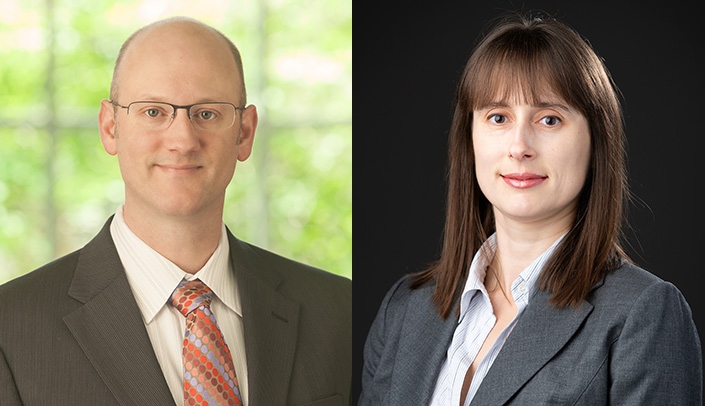A $3 million grant to researchers at the University of Nebraska at Omaha (UNO) and UNMC will fund research and development behind a new generation of stent-graft device that could help prevent issues later in life for patients with aortic disease and trauma.
Anastasia Desyatova, Ph.D., assistant professor in the UNO Department of Biomechanics, received a research project grant (R01) from the National Institutes of Health (NIH) for the project. R01s are the largest individual grants awarded by the NIH to fund individual research projects.
Dr. Desyatova collaborates with Jason MacTaggart, M.D., associate professor in the UNMC Department of Surgery; Alexey Kamenskiy, Ph.D., professor in the UNO Department of Biomechanics; and Kaspars Maleckis, Ph.D., assistant professor in the UNO Department of Biomechanics.
The goal of Dr. Desyatova’s research team is to study the effectiveness of a new generation of stent-graft devices that they developed. These experimental devices are made of an elastic material flexible enough to closely mimic the mechanics of a healthy aorta.
Traditional stent-grafts are generally thought to work well in the aorta but are stiff and do not distend and recoil like the aorta itself. This rigidity can impose additional stress on the heart which, over time, can lead to its thickening and stiffening. These long-term effects are important in young trauma patients treated with stent-grafts because of their long life expectancies, but they may be even more important in older patients with other aortic pathologies and diminished baseline cardiac function.
“By constructing a stent-graft device that functions similarly to a young healthy aorta, our research aims to reduce or mitigate the negative side effects that conventional stiff stent-grafts have on the heart and the aorta,” Dr. Desyatova said. “This new device could have a substantial impact on the long-term well-being of patients living with an injured or diseased aorta.”
The research will be conducted at UNO’s Biomechanics Research Building and in the UNMC Department of Surgery. Significant portions of the project will be performed by Dr. MacTaggart, a vascular surgeon-scientist at UNMC who is a long-term collaborator of Dr. Desyatova. “We greatly appreciate the support of the department of surgery at UNMC”, Dr. Desyatova said. “It is critical to have partnering clinicians because they have first-hand knowledge of the device requirements.”
Desyatova’s team also partners with Live On Nebraska who helps them understand the mechanical characteristics of young human aortas that guide device design.
The research is supported by the National Heart, Lung, and Blood Institute of the National Institutes of Health under Award Number R01HL147128.

Congratulations